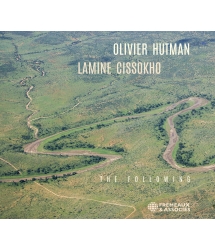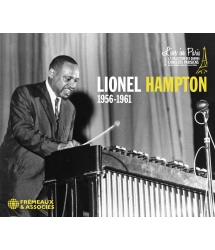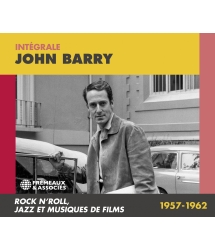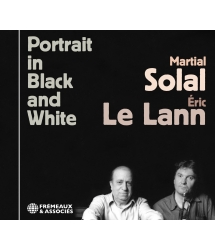- Our Catalog
- Philosophy
- Philosophers of the 20th century and today
- History of Philosophy (PUF)
- Counter-History and Brief Encyclopedia by Michel Onfray
- The philosophical work explained by Luc Ferry
- Ancient thought
- Thinkers of yesterday as seen by the philosophers of today
- Historical philosophical texts interpreted by great actors
- History
- Books (in French)
- Social science
- Historical words
- Audiobooks & Literature
- Our Catalog
- Jazz
- Blues
- Rock - Country - Cajun
- French song
- World music
- Africa
- France
- Québec / Canada
- Hawaï
- West Indies
- Caribbean
- Cuba & Afro-cubain
- Mexico
- South America
- Tango
- Brazil
- Tzigane / Gypsy
- Fado / Portugal
- Flamenco / Spain
- Yiddish / Israel
- China
- Tibet / Nepal
- Asia
- Indian Ocean / Madagascar
- Japan
- Indonesia
- Oceania
- India
- Bangladesh
- USSR / Communist songs
- World music / Miscellaneous
- Classical music
- Composers - Movie Soundtracks
- Sounds of nature
- Our Catalog
- Youth
- Philosophy
- News
- How to order ?
- Receive the catalog
- Manifesto
- Dictionnary











- Our Catalog
- Philosophy
- Philosophers of the 20th century and today
- History of Philosophy (PUF)
- Counter-History and Brief Encyclopedia by Michel Onfray
- The philosophical work explained by Luc Ferry
- Ancient thought
- Thinkers of yesterday as seen by the philosophers of today
- Historical philosophical texts interpreted by great actors
- History
- Books (in French)
- Social science
- Historical words
- Audiobooks & Literature
- Our Catalog
- Jazz
- Blues
- Rock - Country - Cajun
- French song
- World music
- Africa
- France
- Québec / Canada
- Hawaï
- West Indies
- Caribbean
- Cuba & Afro-cubain
- Mexico
- South America
- Tango
- Brazil
- Tzigane / Gypsy
- Fado / Portugal
- Flamenco / Spain
- Yiddish / Israel
- China
- Tibet / Nepal
- Asia
- Indian Ocean / Madagascar
- Japan
- Indonesia
- Oceania
- India
- Bangladesh
- USSR / Communist songs
- World music / Miscellaneous
- Classical music
- Composers - Movie Soundtracks
- Sounds of nature
- Our Catalog
- Youth
- Philosophy
- News
- How to order ?
- Receive the catalog
- Manifesto
- Dictionnary
FINESSE
Ref.: FA527
EAN : 3561302252728
Artistic Direction : DAVE KELBIE
Label : Frémeaux & Associés
Total duration of the pack : 1 hours 3 minutes
Nbre. CD : 1
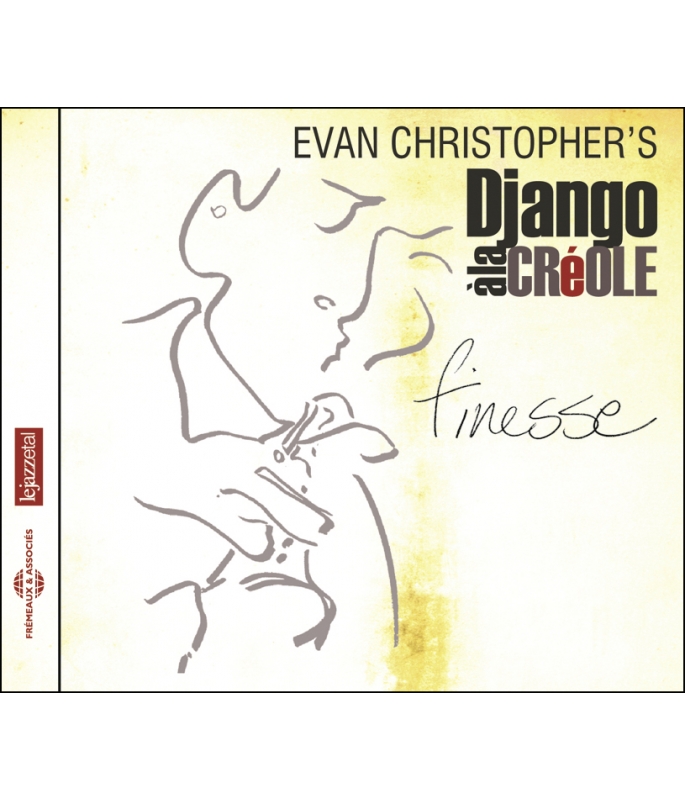
FINESSE
FINESSE
“One of the greatest jazz clarinetists of recent times delves even deeper into his project uniting the legacies of New Orleans jazz and the Gypsy Swing of Django Reinhardt. (Behold the artful “creolization” of Django’s “Improvisation #3”). We proudly offer this CD as a refined synthesis of aesthetics celebrating both the infectious spirit of European Gypsy Swing as well as the contribution of Creole cultures to American music and jazz. Benjamin GOLDENSTEIN & Patrick FRÉMEAUX
“[Evan] is, in my estimation, not only the greatest jazz clarinetist alive, but one of the greatest of all time.” Ahmet ERTEGUN (founding Chairman of Atlantic Records)
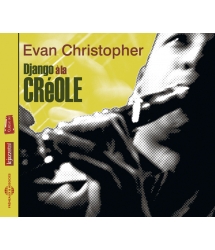
EVAN CHRISTOPHER
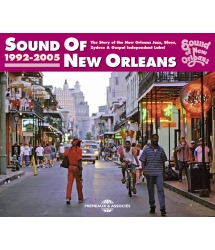
THE STORY OF THE NEW ORLEANS JAZZ, BLUES, ZYDECO &...
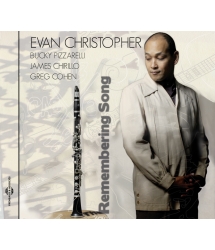
EVAN CHRISTOPHER




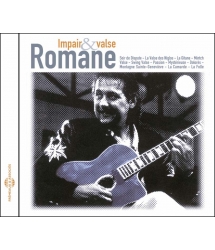
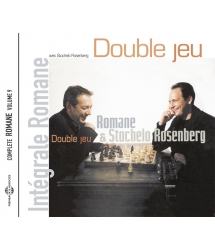
-
PisteTitleMain artistAutorDurationRegistered in
-
1Tropical MoonEvan Christopher00:05:252010
-
2FinesseEvan Christopher00:05:492010
-
3Riverboat ShuffleEvan Christopher00:06:022010
-
4Django à La CréoleEvan Christopher00:06:282010
-
5Solid Old ManEvan Christopher00:05:562010
-
6Songe d'AutomneEvan Christopher00:06:282010
-
7JubileeEvan Christopher00:06:002010
-
8Creole EyesEvan Christopher00:05:042010
-
9FéerieEvan Christopher00:04:022010
-
10Mood IndigoEvan Christopher00:06:492010
-
11Passaporte ao ParaisoEvan Christopher00:05:322010
EVAN CHRISTOPHER’S Django à la Créole Finesse
EVAN CHRISTOPHER’S Django à la Créole
Finesse
Discographie
1. Tropical Moon (Sidney Bechet) 5’23
2. Finesse (Billy Taylor) 5’46
3. Riverboat Shuffle (Hoagy Carmichael - Irving Mills - Dick Voynow) 6’01
4. Django à la Créole (Evan Christopher, based on “Improvisation #3” by Django Reinhardt) 6’25
5. Solid Old Man (Rex Stewart) 5’55
6. Songe d’Automne (Archibald Joyce) 6’32
7. Jubilee (Hoagy Carmichael - Stanley Adams) 3’59
8. Creole Eyes (Louis Moreau Gottschalk) 5’01
9. Féerie (Django Reinhardt) 5’58
10. Mood Indigo (Albany “Barney” Bigard - Edward Kennedy Ellington - Irving Mills) 6’46
11. Passaporte ao Paraìso (Sidney Bechet) 5’33
Evan Christopher clarinette
David Blenkhorn guitare solo
Dave Kelbie guitare rythmique
Sébastien Girardot contrebasse
Produit par Dave Kelbie pour Lejazzetal - Frémeaux & Associés
Conception graphique : Dave Kelbie
Enregistré mixé et masterisé en mars 2010 au Stiwdio Felin Fach, Abergavenny (Uk) - sauf “Jubilee” : enregistré au Resident Studio (Londres)
Mixé par Dylan Fowler & Dave Kelbie
Photos : Jim McGuire - Neal Wright
J’ai toujours rêvé d’une rencontre musicale entre deux musiciens géniaux et fantasques : le créole néo-orléanais Sidney Bechet et le manouche Django Reinhardt. Tous deux habitaient Paris, et se sont sans doute croisés entre 1949 et 1953. Peut-être leur statut de vedette et leurs contrats respectifs avec des maisons de disques ne leur ont pas permis de se mesurer en studio, ou peut-être simplement ne le désiraient-ils pas. Une frustration de plus pour l’amateur de jazz passionné ! Bechet enregistra néanmoins Nuages, le tube de Django, douze jours après la mort du guitariste. Et Django n’avait-il pas rencontré en studio un autre clarinettiste créole de La Nouvelle-Orléans, Barney Bigard, en 1939.
Heureusement, pour apaiser quelque peu mes regrets, la rencontre entre ces deux styles de jazz a enfin eu lieu : Evan Christopher et ses camarades ont inventé le “manouche à la créole”, et il faut croire que la sauce a bien pris puisque voici leur deuxième disque, conséquemment plus mature, montrant plus d’intégrité rythmique et d’interaction entre les instruments (avec un David Blenkhorn utilisant parfois la guitare électrique). Selon Evan, Tropical Moon est l’un des morceaux les plus intéressants de la séance que Bechet enregistra en 1939 avec le Haitian Orchestra. Ce choix reflète la passion d’Evan pour la musique antillaise.
Le petit bijou de simplicité Finesse a été enregistré tout d’abord en mars 1939 par Duke Ellington en trio avec Johnny Hodges et le bassiste Billy Taylor. Quinze jours plus tard, Taylor se retrouve à Paris en compagnie des Ellingtoniens Rex Stewart et Barney Bigard, accompagnés par Django qui leur en bouche un coin. Ils enregistrent Finesse. Ici le thème de 16 mesures est exposé tout d’abord par la guitare, puis par la basse tout en respectant le climat du titre et en reprenant l’accompagnement en arpèges d’Ellington, mais à la guitare. Le climat change quand la clarinette d’Evan entre sur un rythme latin. La paternité du morceau (aussi connu sous le nom de Night Wind) est objet de controverses, puisqu’elle est attribuée à Ellington et Hodges, mais parfois aussi à Billy Taylor, tandis que Rex Stewart la réclame lui aussi dans son livre de souvenirs !
Riverboat Shuffle : Hoagy Carmichael et son copain Bix Beiderbecke à la sauce Hot Club de France. Evan explique sa composition Django à la Créole : “Elle utilise des éléments des Improvisations de Django en solo : trois mélodies tirées de son Improvisation N° 3, pt 1 & 2. Elles sont arrangées à la manière “Spanish tinge” de certaines pièces de Jelly Roll Morton comme The Crave”. Dans le blues Solid Old Man, enregistré au cours de la même séance parisienne que Finesse, les musiciens ont voulu capturer l’esprit du Django des années 1950. La guitare d’accompagnement pratique le “shuffle” que Reinhardt aimait à jouer derrière les solistes. Songe d’automne (Autumn Dream) est au départ une valse (composée par Archibald Joyce, “The English Waltz King”) que Django transforme en jazz en 1947. C’est l’une des interprétations de Reinhardt avec Hubert Rostaing qu’Evan préfère. Il donne à cette valse anglaise un parfum de samba. Jubilee a été écrit par Hoagy Carmichael pour le film “Every Day’s a Holiday” (1938) dont la vedette était la fabuleuse Mae West. Mais c’est Louis Armstrong qui crée ce morceau à l’écran, dirigeant fièrement une parade de rue. Satchmo était l’une des premières idoles de Django Reinhardt qui subit beaucoup son influence au début des années 1930. Ici c’est la guitare solo qui reprend l’introduction orchestrale de la version d’Armstrong. Parmi les nombreuses citations qui parsèment cette interprétation, on remarquera justement à la guitare des riffs du trompettiste sur St. Louis Blues en 1929 et sa célèbre introduction sur Mahogany Hall Stomp. Et puis après le solo de guitare, l’ensemble cite brièvement une composition de Django, Belleville.
Dans Ojos Criollos (Les Yeux créoles, Creole Eyes), Evan montre le moelleux de sa sonorité et l’excellence de sa technique coulée, bien épaulé par sa section rythmique. Ils me font préférer leur version à celle pour piano. Le pianiste Louis Moreau Gottschalk est le premier compositeur à s’inspirer de la musique des esclaves que l’on pouvait entendre à Congo Square à La Nouvelle-Orléans. Il mêle habilement des éléments de musique romantique européenne, de musique cubaine et de musique noire américaine. Globe-trotter infatigable, il eut le mérite d’aller chercher rythmes et sonorités particulières à leur source. Cette danse cubaine date de 1859. Féerie, une composition ambitieuse de Django, fut enregistrée tout d’abord en 1942 par le Quintette augmenté de neuf musiciens, puis avec le quintette en 1947. Sur ce morceau rapide et difficile, Evan et ses amis démontrent tout en souplesse leur maîtrise, technique bien sûr, mais surtout celle de l’esprit du célèbre manouche. Un feu d’artifice ! Mood Indigo a été joué dans tous les styles de jazz. Selon ses dires, Barney Bigard serait l’auteur du deuxième thème (une variation du premier). Il aurait développé une phrase de son professeur néo-orléanais Lorenzo Tio Jr. Ici les musiciens jouent sur la simplicité et le feeling, malgré la coda étonnante qui vient ajouter une petite touche dissonante plus Reinhardtienne qu’Ellingtonienne.
Ce CD commence avec Sidney Bechet et se clôt avec lui par une de ses plus belles composition période française : Passport to Paradise. Remarquez le traitement original, en choro brésilien. Entre le tzigane, la musique créole, des îles ou de la Nouvelle-Orléans, les détours par Cuba ou le Brésil, la sauce prend bien quand on la chauffe à la bonne température. Et n’oublions pas que dès 1929, dans les boîtes de Pigalle (où jouait Bechet), quelques-unes de ces musiques, et d’autres, se côtoyaient joyeusement dans un petit périmètre : le jazz, le tango, la musique cubaine, la biguine antillaise, le musette. En tout cas, à notre époque où les musiques dites actuelles oscillent entre double fortissimo et triple fortissimo, une belle équipe de musiciens ose la finesse et la demi-teinte. Avec un culot dont on ne va certainement pas se plaindre !
Philippe BAUDOIN, Auteur de Une Chronologie du Jazz
english notes
I have always dreamed of a musical meeting between the two extraordinary musical geniuses, New Orleans Creole Sidney Bechet and Gypsy Django Reinhardt. Both lived in Paris and undoubtedly crossed paths between 1949 and 1953. Maybe their star-status and respective contracts with record labels did not permit a duel in the studio, or perhaps they simply weren’t interested. What a disappointment for the passionate jazz lover! Nevertheless, Bechet recorded Django’s hit, Nuages, just twelve days after the guitarist passed away. And didn’t Django, in a 1939 recording session meet another Creole clarinetist from New Orleans, Barney Bigard? Fortunately, somewhat alleviating my regrets, the meeting between these two styles of jazz has finally taken place. Evan Christopher and his fellow musicians have invented a “Créole Gypsy” style, and one can trust that the mix is working well since this is their second disc, consequently more mature, boasting more rhythmic integrity and more deliberate interaction among the instruments (with David Blenkhorn sometimes using electric guitar).
For Evan, Tropical Moon is one of the more interesting pieces that Bechet recorded in the 1939 session with a band he called the Haitian Orchestra. This choice reflects Evan’s passion for the music of the French West Indies. A gem of simplicity, Finesse was first recorded in March of 1939 by Duke Ellington in a trio with Johnny Hodges and bassist Billy Taylor. Fifteen days later, in Paris, Taylor found himself with Rex Stewart and Barney Bigard. Joined by Django who astonished the Ellingtonians, they recorded Finesse. Here, however, the 16-bar theme is first stated by the guitar, then passed to the bass while the guitar respects the mood of the original version emulating Ellington’s arpeggio accompaniment. The atmosphere changes when Evan’s clarinet enters on a Latin rhythm. Authorship of the piece (also released under the title Night Wind) is subject to controversy, sometimes credited to Ellington and Hodges, but often to Billy Taylor, while Rex Stewart also claimed to be the composer in his memoirs. Riverboat Shuffle cooks like Hoagy Carmichael and his pal Bix Beiderbecke with a “Hot Club de France” seasoning.
Evan explains his composition, Django à la Créole: “It’s based on three themes from Django’s solo, Improvisation No. 3 (parts 1 & 2), that I arranged in the manner of Jelly Roll Morton’s “Spanish Tinge” pieces like The Crave.” In the blues, Solid Old Man, recorded during the same Paris session as Finesse, the musicians have endeavored to capture the spirit of 1950s Django. The rhythm guitar exploits a “shuffle” that Reinhardt loved to play behind soloists. Songe d’Automne (Autumn Dream) was originally a waltz composed by Archibald Joyce (known as ‘The English Waltz King’). Django had arranged it in a swing style in 1947, one of Evan’s favourite recordings of Reinhardt with Hubert Rostaing. Here, however, he gives this English waltz a samba flavor. Jubilee was written by Hoagy Carmichael for “Every Day’s a Holiday,” a 1938 movie that starred the fabulous Mae West. But on screen, it’s Louis Armstrong who first introduces this number proudly leading a street parade. Satchmo was one of Django Reinhardt’s first idols and influenced him greatly in the early 1930s. In this track, the solo guitar plays the fanfare introduction of the Armstrong version. Among the many quotations strewn throughout are trumpet riffs played by the guitar from Armstrong’s 1929 St. Louis Blues as well as his famous intro on Mahogany Hall Stomp. After the guitar solo, the group briefly quotes Django’s composition, Belleville.
In Creole Eyes (Ojos Criollos), Evan displays the mellow side of his sound and his fluid technique, perfectly framed by the rhythm section. It makes me prefer this version to the original for solo piano. Pianist Louis Moreau Gottschalk was the first composer inspired by the African music of the slaves that one could hear in Congo Square, New Orleans. He cleverly combined Cuban and African-American elements with European Romantic classical music. A tireless globetrotter, he can be credited for going to the source in search of these particular rhythms and colours first-hand. This “Danse Cubaine” dates back to 1859. Féerie, an ambitious composition by Django, was first recorded in 1942 by the Quintet augmented with nine pieces, then five years later by just the Quintet. In this fast and difficult piece, Evan and his friends adroitly demonstrate not only their technical skills but also their ability to capture the spirit of the renowned Gypsy. Fireworks! Mood Indigo has been played in all styles of jazz. According to Barney Bigard, he was the composer of the second theme (a variation of the first) that develops an idea from his teacher, New Orleanian Lorenzo Tio Jr. Here, the musicians emphasize restraint and emotion, in spite of a surprising coda that adds a slight touch of dissonance, more Reinhardt than Ellington.
This CD begins with Sidney Bechet and, with one of the finest compositions written during his last years in France, Passport to Paradise, also closes with Bechet. Notice their unique treatment of the original as a Brazilian Choro. Through musics Créole and Gypsy, the Caribbean and New Orleans, via Cuba and Brazil, the flavors work well together when heated to the right temperature. Let us not forget, also, that from 1929, in the clubs of Pigalle (where Bechet played), these styles and others were joyously mingling within a small perimeter: Jazz, Tango, Cuban music, West-Indian Biguine, Musette. In any case, at a time when the musics considered popular are played between double and triple forte, let us salute this fine team of musicians who dares the alternative of finesse with an audacity beyond reproach.
Philippe BAUDOIN, Auteur de l’ouvrage Une Chronologie du Jazz
*
* *
PRESS QUOTES
Times concert review by Clive Davis (The Times)
Django à la Créole, Bloomsbury, Theatre, WC1
Magical quartet Django à la Créole produced a spellbinding performance, and more than lived up to expectations
A few weeks ago Hugh Laurie gave us a genial guided tour of New Orleans in his latest incarnation as a blues musician. Doctor House meets Professor Longhair. Evan Christopher’s approach to the Crescent City’s heritage is even more inspired. A youngish clarinettist from California, he made his home in the cradle of jazz and, when Hurricane Katrina forced him to pack his bags, headed for Paris, where he channelled his talents into a magical quartet, Django à la Créole.
The band’s most recent disc, Finesse, was my favourite album of last year, and this concert — a display of chamber jazz at its most nuanced — more than lived up to expectations. If the audience was modest, the performance was simply spellbinding.
When Woody Allen brings his New Orleans group to town, the power of celebrity means that he can sell out Hammersmith Apollo, which is no bad thing, of course. But while Allen never pretends to be more than an amateur enthusiast, Christopher is a hugely gifted player who wears his learning incredibly lightly. Nor is this an exercise in nostalgia. An unorthodox line-up, with David Blenkhorn’s deft electric guitar balanced by Dave Kelbie’s acoustic rhythm guitar and Sébastien Girardot’s double bass, gives the repertoire immense suppleness.
When the quartet swooped into Songe d’Automne, for example, Kelbie generated an infectious samba beat before Christopher dismantled his own instrument in order to add exotic, cuíca-like sounds on his mouthpiece.
The combination of Django-esque swing and a generous helping of Jelly Roll Morton’s “Spanish tinge” would have been a revelation to anyone who still associates New Orleans jazz with the chug-chug-chug of the banjo. In this largely unamplified concert, Christopher was capable of effortless shifts in dynamics, leaping from flourishes worthy of Sidney Bechet at his most imperious to the lightest of whispers. Tropical Moon added a touch of Haitian rumba, while the sensuous Mama Nita rolled its hips with pure abandon. They’re at the Edinburgh Jazz & Blues Festival in July. Don’t miss it.
by Clive DAVIS - THE TIMES (UK)
CD EVAN CHRISTOPHER’S Django à la Créole Finesse Evan Christopher - Finesse © Frémeaux & Associés (frémeaux, frémaux, frémau, frémaud, frémault, frémo, frémont, fermeaux, fremeaux, fremaux, fremau, fremaud, fremault, fremo, fremont, CD audio, 78 tours, disques anciens, CD à acheter, écouter des vieux enregistrements, albums, rééditions, anthologies ou intégrales sont disponibles sous forme de CD et par téléchargement.)
